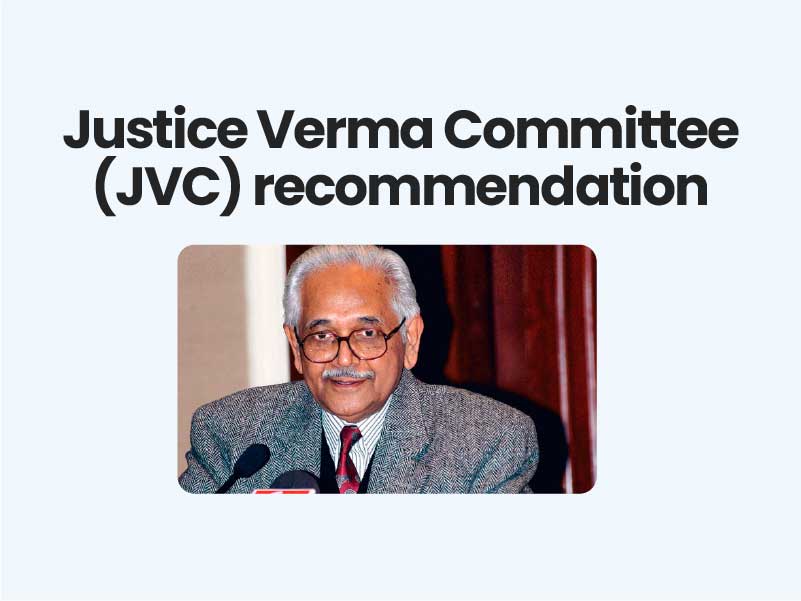Companion@360 → 7 Month programme to sharpen your writing skills → REGISTER NOW

Justice Verma Committee (JVC) recommendation:
- Punishment for Rape: The panel has not recommended the death penalty for rapists. It suggests that the punishment for rape should be rigorous imprisonment or RI for seven years to life. It recommends that punishment for causing death or a “persistent vegetative state” should be RI for a term not be less than 20 years, but may be for life also, which shall mean the rest of the person’s life. Gang-rape, it suggests should entail punishment of not less than 20 years, which may also extend to life and gang-rape followed by death, should be punished with life imprisonment.
- Punishment for other sexual offences: The panel recognised the need to curb all forms of sexual offences and recommended – Voyeurism be punished with upto seven years in jail; stalking or attempts to contact a person repeatedly through any means by up to three years. Acid attacks would be punished by up to seven years if imprisonment; trafficking will be punished with RI for seven to ten years.
- Registering complaints and medical examination: Every complaint of rape must be registered by the police and civil society should perform its duty to report any case of rape coming to its knowledge. “Any officer, who fails to register a case of rape reported to him, or attempts to abort its investigation, commits an offence which shall be punishable as prescribed,” the report says. The protocols for medical examination of victims of sexual assault have also been suggested. The panel said, “Such protocol based, professional medical examination is imperative for uniform practice and implementation.”
- Bill of Rights for women:A separate Bill of Rights for women that entitles a woman a life of dignity and security and will ensure that a woman shall have the right to have complete sexual autonomy including with respect to her relationships.
The major differences between the Ordinance passed by the government and the J. S. Verma Committee recommendations were:
- The Justice J. S. Verma Committee recommended 20 years imprisonment for gang-rape and life imprisonment for rape and murder but refrained from using the term “death penalty” though there was public outcry to sentence rapists with death sentence following the brutal gang-rape and murder of a 23-year-old medical student in Delhi on December 16, 2012.
However, the ordinance passed by the Cabinet went for a harsher punishment for a rapist – a minimum of 20 years imprisonment for rapists and even death penalty in extreme cases.
-
- Verma panel reccomended criminalization of marital rape but the ordinance rejected it.
- The Justice J. S. Verma Committee recommended restriction of politicians facing sexual offence charges from contesting elections. Ordinance rejected this recommendation.
- The panel recommended that the senior police or army officials be held responsible for sexual offences committed by their junior but the ordinance rejected it.
- The Justice J. S. Verma Committee wanted to make videography of recording statement from victim mandatory but the ordinance made it optional.
- The Justice J. S. Verma Committee wanted the definition for sexual offences as rape but the ordinance replaced it with the word “sexual assault”.
Criticisms:
- The law has been severely criticized for being gender biased and giving women the legal authority to commit exactly the same crimes (against which they seek protection) against men with impunity.
- The Criminal Law (Amendment) Ordinance, 2013 has been strongly criticised by several human rights and women’s rights organisations for not including certain suggestions recommended by the Verma Committee Report like, marital rape, reduction of age of consent, amending Armed Forces (Special Powers) Act so that no sanction is needed for prosecuting an armed force personnel accused of a crime against woman.
Conclusion:
The Criminal Law (Amendment) Act, 2013 has been known all over as one of the most concrete steps taken by the Indian government to curb violence against women. Major amendments by the Act in the Indian Penal Code, not only widen the ambit of certain offences but also recognises new offences like acid attacks which earlier lacked a specific provision and definition in the Code.
Despite its flaws, the Act bears a progressive insight to make an impact and fight a battle against violence against women. However, the Act by itself is not sufficient to redress and seek justice for violence against women. For this, the Government of India needs to make colossal investments in building necessary infrastructure to deal with the crimes supplemented by meaningful reforms in judiciary (building fast track women’s courts, more engagement of women lawyers, women doctors to examine victims) and modernisation of the police system across whole of India.
Despite its flaws, the Act bears a progressive insight to make an impact and fight a battle against violence against women. However, the Act by itself is not sufficient to redress and seek justice for violence against women. For this, the Government of India needs to make colossal investments in building necessary infrastructure to deal with the crimes supplemented by meaningful reforms in judiciary (building fast track women’s courts, more engagement of women lawyers, women doctors to examine victims) and modernisation of the police system across whole of India.
Read Also PMJAY SEHAT scheme



[…] Justice Verma Committee (JVC) recommendation […]